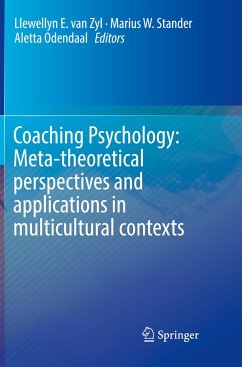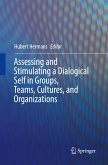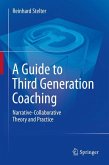Coaching Psychology: Meta-theoretical perspectives and applications in multicultural contexts
Herausgegeben:van Zyl, Llewellyn E.; Stander, Marius W.; Odendaal, Aletta
Coaching Psychology: Meta-theoretical perspectives and applications in multicultural contexts
Herausgegeben:van Zyl, Llewellyn E.; Stander, Marius W.; Odendaal, Aletta
- Broschiertes Buch
- Merkliste
- Auf die Merkliste
- Bewerten Bewerten
- Teilen
- Produkt teilen
- Produkterinnerung
- Produkterinnerung
This book offers detailed strategies, methodologies, approaches, practice guidelines, and policy implications effective for professional coaching on the individual, group and organizational level. It details empirical research-based and theoretical perspectives on coaching psychology as well as elaborates upon the fundamentals within multi-cultural contexts. First delivering a general introduction to coaching psychology before going on to examine specific psychological approaches towards coaching. The book also provides a conceptual framework for the use of psychometrics in multi-cultural…mehr
Andere Kunden interessierten sich auch für
![Theoretical Orientations and Practical Applications of Psychological Ownership Theoretical Orientations and Practical Applications of Psychological Ownership]() Theoretical Orientations and Practical Applications of Psychological Ownership105,99 €
Theoretical Orientations and Practical Applications of Psychological Ownership105,99 €![Theory, Research, and Practical Guidelines for Family Life Coaching Theory, Research, and Practical Guidelines for Family Life Coaching]() Kimberly AllenTheory, Research, and Practical Guidelines for Family Life Coaching69,99 €
Kimberly AllenTheory, Research, and Practical Guidelines for Family Life Coaching69,99 €![Theoretical Orientations and Practical Applications of Psychological Ownership Theoretical Orientations and Practical Applications of Psychological Ownership]() Theoretical Orientations and Practical Applications of Psychological Ownership105,99 €
Theoretical Orientations and Practical Applications of Psychological Ownership105,99 €![Assessing and Stimulating a Dialogical Self in Groups, Teams, Cultures, and Organizations Assessing and Stimulating a Dialogical Self in Groups, Teams, Cultures, and Organizations]() Assessing and Stimulating a Dialogical Self in Groups, Teams, Cultures, and Organizations41,99 €
Assessing and Stimulating a Dialogical Self in Groups, Teams, Cultures, and Organizations41,99 €![Job Demands in a Changing World of Work Job Demands in a Changing World of Work]() Job Demands in a Changing World of Work81,99 €
Job Demands in a Changing World of Work81,99 €![Personal Consultancy Personal Consultancy]() Nash PopovicPersonal Consultancy194,99 €
Nash PopovicPersonal Consultancy194,99 €![A Guide to Third Generation Coaching A Guide to Third Generation Coaching]() Reinhard StelterA Guide to Third Generation Coaching61,99 €
Reinhard StelterA Guide to Third Generation Coaching61,99 €-
-
-
This book offers detailed strategies, methodologies, approaches, practice guidelines, and policy implications effective for professional coaching on the individual, group and organizational level. It details empirical research-based and theoretical perspectives on coaching psychology as well as elaborates upon the fundamentals within multi-cultural contexts. First delivering a general introduction to coaching psychology before going on to examine specific psychological approaches towards coaching. The book also provides a conceptual framework for the use of psychometrics in multi-cultural coaching psychology. Next, the book presents meta-theoretical perspectives and applications for multi-cultural contexts, such as how to enhance leadership with group coaching from a system psychodynamic approach, how coaching can be used to support behavioral engagement and wellbeing, and how to utilize symbolic expressions, art, myths, dreams, and fantasies in coaching. This book provides practical tools towards critical self-reflective practice. Delivering the current state of the art research by presenting psychological coaching strategies theory and practice in one viewpoint. It also informs on the activity of various research approaches, thus interesting the broader student and academic reader. It will help all readers evaluate their current coaching competencies and, in the end, become better coaches. The book will also serve as an ideal resource for psychologists who want to migrate into coaching psychology.
Produktdetails
- Produktdetails
- Verlag: Springer / Springer International Publishing / Springer, Berlin
- Artikelnr. des Verlages: 978-3-319-80942-7
- Softcover reprint of the original 1st ed. 2016
- Seitenzahl: 452
- Erscheinungstermin: 30. Mai 2018
- Englisch
- Abmessung: 235mm x 155mm x 23mm
- Gewicht: 762g
- ISBN-13: 9783319809427
- ISBN-10: 3319809423
- Artikelnr.: 53574347
- Herstellerkennzeichnung Die Herstellerinformationen sind derzeit nicht verfügbar.
- Verlag: Springer / Springer International Publishing / Springer, Berlin
- Artikelnr. des Verlages: 978-3-319-80942-7
- Softcover reprint of the original 1st ed. 2016
- Seitenzahl: 452
- Erscheinungstermin: 30. Mai 2018
- Englisch
- Abmessung: 235mm x 155mm x 23mm
- Gewicht: 762g
- ISBN-13: 9783319809427
- ISBN-10: 3319809423
- Artikelnr.: 53574347
- Herstellerkennzeichnung Die Herstellerinformationen sind derzeit nicht verfügbar.
Llewellyn van Zyl (PhD) is an associate professor with the University of South Africa and the associate editor for the South African Journal of Industrial Psychology. He is registered as a psychologist (Category: Industrial) with the Health Professions Council of South Africa. He has completed a Doctorate degree in the field of Industrial Psychology, specialising in Positive Psychological Interventions. He also holds a Master of Commerce, an Honours and a Bachelor's degree in Industrial Psychology, which were obtained from the North-West University (cum laude) at the top of his class. Furthermore, he serves on the executive committee of the Society of Industrial and Organisational Psychology of South Africa. Llewellyn has a passion for strengths-based people development, coaching psychology, happiness, consumer behaviour and social media. Aletta Oldendaal is a practicing Industrial Psychologist and academic and is currently the Qualification Leader for the new Masters in Leadership Coaching at the University of Johannesburg. She has more than 20 years' experience in strategic executive leadership development, coaching and assessment interventions across all levels in different organisations in South Africa that include mining, retail, engineering, academic institutions, Government, NGO's, media and communications. Her research interests are primarily in the field of psychological assessment, leadership development and coaching psychology. As a scholar she has presented a number of papers at national and international conferences and published research results in academic journals. Aletta is co-author and editor of the Southern African edition of Stephen Robbins and Timothy Judge's Organizational Behaviour book. Her passion and commitment to the development of coaching psychology and service to industrial psychology is reflected in her national and international leadership and involvement. She participated in the Global Convention of Coaching in 2007 in NewYork and represented SIOPSA in 2008 in Dublin. She was President of SIOPSA for the period June 2002 to June 2006, Chair of People Assessment in Industry (2008-2011) and was awarded honorary membership of SIOPSA in 2006. She is currently serving her term as elected council member of the International Test Commission (ITC). Aletta is a founder member of the Interest Group in Coaching and Consulting Psychology and also co-represented South Africa in the First International Congress of Coaching Psychology in London (2010), Pretoria (2011), and Barcelona (2011). She is a member of the International Steering Committee and Honorary Vice President of the International Society of Coaching Psychology. She holds a MPhil (cum laude) and DPhil in Industrial Psychology from the University of Johannesburg. Marius W. Stander is a professor and a management consultant specialising in the assessment and optimisation of talented people and teams. He has been lecturing Industrial Psychology on postgraduate level at the Potchefstroom University, North-West University (Potchefstroom & Vaal Triangle campus) as well as UJ (previously RAU) and the University of Namibia. He studied at the University of Potchefstroom and North-West University and holds an M Com (cum laude) and PhD in Industrial Psychology. Previously he was GM of an outsourcing company for two years. He is currently the co-managing director of Psychai Management Consultants. He is a registered Industrial Psychologist (HPCSA), Mentor and a Master HR Practitioner (SABPP). He has been consulting in South Africa and Namibia for various companies and local authorities over the past 28 years. He has been consulting for various companies and local authorities over the past 25 years. His fields of expertise include: talent management, assessment of potential, leadership development, team building and coaching psychology.
PART I: FUNDAMENTALS OF COACHING PSYCHOLOGY IN MULTI-CULTURAL CONTEXTS.- Chapter 1: Coaching Psychology Research: A Journey of Development; Jonathan Passmore and Tim Theeboom.- Chapter 2: Coaching and Flourishing: From Theory to Practice; Sebastiaan Rothmann, Sr.- Chapter 3: The Coach as a Fellow-human Companion: The Coach-coachee Relationship in the Hypercomplex Society; Reinhard Stelter.- Chapter 4: Psychological and Psychometric Assessments in Coaching: A Cross-cultural Perspective; Aletta Odendaal.- Chapter 5: Supervision in Coaching.- Chapter 6: Morality on the Executive's Couch: Ethical Perspectives on Coaching Psychology; Mias de Klerk.- PART II: PSYCHOLOGICAL APPROACHES TOWARDS COACHING PSYCHOLOGY IN MULTI-CULTURAL CONTEXTS.- Chapter 7: Exploring the Role of Psychological Ownership in the Coaching Process.- Chapter 8: Coaching for Career Agency: A Psychological Career Resources Framework; Melinde Coetzee.- Chapter 9: A Coaching Model for Developing Values-based, Authentic Leadership; Steven Breger.- Chapter 10: AI Coaching: Co-constructing Transformational Development and Change; Freddie Crous and Chantelle Rose.- Chapter 11: A Conceptual Multi-cultural Coaching Model for Leadership Development; Llewellyn Ellardus van Zyl and Marius W. Stander.- Chapter 12: An Archetypal Approach to Coaching; Daniel Hercules du Toit.- Chapter 13: Systemic Thinking and Transcultural Approaches in Coaching Psychology: Introducing a New Coaching Model; Claude-Hélène Mayer and Rian Viviers.- PART III: META-THEORETICAL PERSPECTIVES AND APPLICATIONS.- Chapter 14: Team Coaching from a Systems Psychodynamic and Systems Constellations Perspective; Gail Wrogemann.- Chapter 15: A Strengths, Opportunities, Aspirations, and Results (soar) Based Approach to Coaching Psychology; Matthew Cole and Jacqueline Stavros.- Chapter 16: Strength Based Coaching as an Enabler of Positive Outcomes in Athletes: Developing a Coaching Model; Ederick Stander.- Chapter 17: Group Coaching from System Psychodynamic Approach to Enhance Women's Leadership Qualities: A Case Example; Michelle S. May.- Chapter 18: Coaching towards Orgination; Freddie Crous.- Chapter 19: On Creating Engagement (Through Coaching) in Three Life Domains: A Self-determination Theory Perspective; Gordon B. Spence and Christopher P. Niemiec.- Chapter 20: Utilising Symbolic Expressions, Art, Myths, Dreams and Fantasies in Coaching; Daniel Hercules du Toit.- Chapter 21: Exploring Positive Psychology and Person-centered Psychology in Multi-cultural Coaching; Llewellyn van Zyl, Renate Motschnig-Pitrik and Marius W. Stander.- Chapter 22: Training Emerging Psychologists as Multi-cultural Context Coaches; Lené I. Jorgensen, Llewellyn Ellardus van Zyl and Marius W. Stander.- Chapter 23: The Future of Multi-cultural Coaching Psychology; Llewellyn Ellardus van Zyl, Aletta Odendaal and Marius W. Stander.
PART I: FUNDAMENTALS OF COACHING PSYCHOLOGY IN MULTI-CULTURAL CONTEXTS.- Chapter 1: Coaching Psychology Research: A Journey of Development; Jonathan Passmore and Tim Theeboom.- Chapter 2: Coaching and Flourishing: From Theory to Practice; Sebastiaan Rothmann, Sr.- Chapter 3: The Coach as a Fellow-human Companion: The Coach-coachee Relationship in the Hypercomplex Society; Reinhard Stelter.- Chapter 4: Psychological and Psychometric Assessments in Coaching: A Cross-cultural Perspective; Aletta Odendaal.- Chapter 5: Supervision in Coaching.- Chapter 6: Morality on the Executive's Couch: Ethical Perspectives on Coaching Psychology; Mias de Klerk.- PART II: PSYCHOLOGICAL APPROACHES TOWARDS COACHING PSYCHOLOGY IN MULTI-CULTURAL CONTEXTS.- Chapter 7: Exploring the Role of Psychological Ownership in the Coaching Process.- Chapter 8: Coaching for Career Agency: A Psychological Career Resources Framework; Melinde Coetzee.- Chapter 9: A Coaching Model for Developing Values-based, Authentic Leadership; Steven Breger.- Chapter 10: AI Coaching: Co-constructing Transformational Development and Change; Freddie Crous and Chantelle Rose.- Chapter 11: A Conceptual Multi-cultural Coaching Model for Leadership Development; Llewellyn Ellardus van Zyl and Marius W. Stander.- Chapter 12: An Archetypal Approach to Coaching; Daniel Hercules du Toit.- Chapter 13: Systemic Thinking and Transcultural Approaches in Coaching Psychology: Introducing a New Coaching Model; Claude-Hélène Mayer and Rian Viviers.- PART III: META-THEORETICAL PERSPECTIVES AND APPLICATIONS.- Chapter 14: Team Coaching from a Systems Psychodynamic and Systems Constellations Perspective; Gail Wrogemann.- Chapter 15: A Strengths, Opportunities, Aspirations, and Results (soar) Based Approach to Coaching Psychology; Matthew Cole and Jacqueline Stavros.- Chapter 16: Strength Based Coaching as an Enabler of Positive Outcomes in Athletes: Developing a Coaching Model; Ederick Stander.- Chapter 17: Group Coaching from System Psychodynamic Approach to Enhance Women's Leadership Qualities: A Case Example; Michelle S. May.- Chapter 18: Coaching towards Orgination; Freddie Crous.- Chapter 19: On Creating Engagement (Through Coaching) in Three Life Domains: A Self-determination Theory Perspective; Gordon B. Spence and Christopher P. Niemiec.- Chapter 20: Utilising Symbolic Expressions, Art, Myths, Dreams and Fantasies in Coaching; Daniel Hercules du Toit.- Chapter 21: Exploring Positive Psychology and Person-centered Psychology in Multi-cultural Coaching; Llewellyn van Zyl, Renate Motschnig-Pitrik and Marius W. Stander.- Chapter 22: Training Emerging Psychologists as Multi-cultural Context Coaches; Lené I. Jorgensen, Llewellyn Ellardus van Zyl and Marius W. Stander.- Chapter 23: The Future of Multi-cultural Coaching Psychology; Llewellyn Ellardus van Zyl, Aletta Odendaal and Marius W. Stander.








